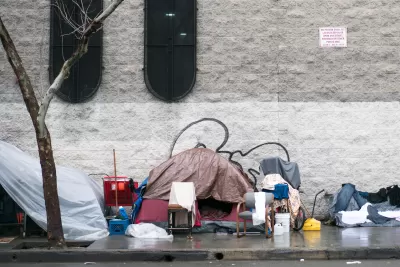More evidence finds that the root cause of homelessness is, ultimately, a lack of sufficient housing.

Despite a commonly repeated assumption that unhoused people flock to warm West Coast cities and exacerbate the housing and homelessness crisis there, research from UC San Francisco contradicts these claims, reports Jerusalem Demsas in The Atlantic.
The survey, “the largest representative survey of homeless people in more than 25 years,” found that only 10 percent of respondents became homeless outside of California, and many of them had prior ties to the state that prompted them to return.
Demsas points out that the theory doesn’t stand up to scrutiny: “Moving is expensive. People who lose their housing rarely have the means to transport themselves, their families, their pets, and their belongings across the country.”
The most frequently reported reason for loss of housing was reduction of income due to unemployment or a decrease in work hours. Economic reasons were followed by two social ones: conflict among residents, and concerns about imposing on roommates or family members. These social reasons would, in a more affordable environment, lead simply to a change of address, not homelessness.
Ultimately, Demsas points out, regardless of the services available to unhoused people, “the crisis of homelessness is a crisis of homes.” California and other states with expensive housing have to build their way out of the crisis.
FULL STORY: The Root Cause of the Homelessness Crisis

Maui's Vacation Rental Debate Turns Ugly
Verbal attacks, misinformation campaigns and fistfights plague a high-stakes debate to convert thousands of vacation rentals into long-term housing.

Planetizen Federal Action Tracker
A weekly monitor of how Trump’s orders and actions are impacting planners and planning in America.

Chicago’s Ghost Rails
Just beneath the surface of the modern city lie the remnants of its expansive early 20th-century streetcar system.

Bend, Oregon Zoning Reforms Prioritize Small-Scale Housing
The city altered its zoning code to allow multi-family housing and eliminated parking mandates citywide.

Amtrak Cutting Jobs, Funding to High-Speed Rail
The agency plans to cut 10 percent of its workforce and has confirmed it will not fund new high-speed rail projects.

LA Denies Basic Services to Unhoused Residents
The city has repeatedly failed to respond to requests for trash pickup at encampment sites, and eliminated a program that provided mobile showers and toilets.
Urban Design for Planners 1: Software Tools
This six-course series explores essential urban design concepts using open source software and equips planners with the tools they need to participate fully in the urban design process.
Planning for Universal Design
Learn the tools for implementing Universal Design in planning regulations.
planning NEXT
Appalachian Highlands Housing Partners
Mpact (founded as Rail~Volution)
City of Camden Redevelopment Agency
City of Astoria
City of Portland
City of Laramie





























